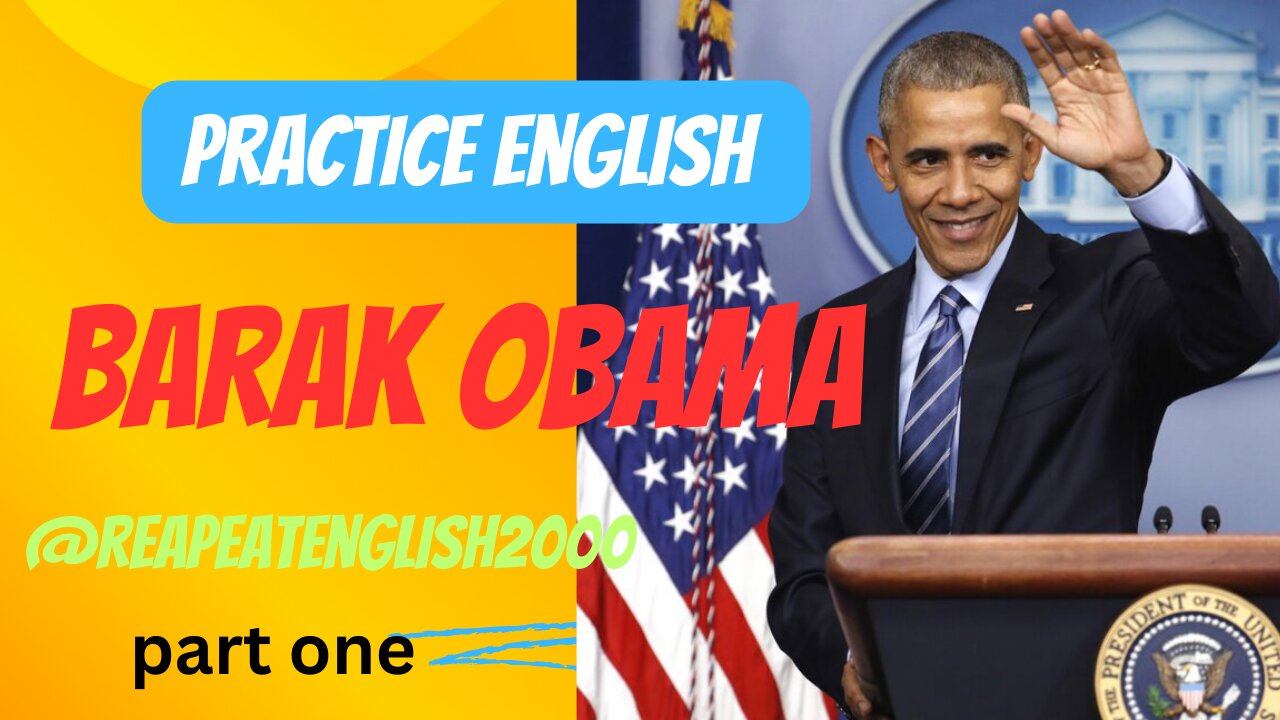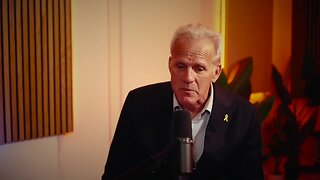Premium Only Content

Practice English with Barak Obama || part one
Learning English through speeches can be an enriching and dynamic experience, offering insights into language, culture, and history while honing language skills. Speeches are a potent medium for language learners due to their clarity, structure, and often impassioned delivery. Whether it's the soaring rhetoric of political leaders, the inspirational words of activists, or the persuasive arguments of scholars, speeches offer a window into the nuances of language that textbooks often lack.
One of the primary advantages of using speeches for language learning is their authenticity. Unlike contrived exercises or textbook dialogues, speeches reflect real-world communication. They showcase the natural flow of language, including idiomatic expressions, rhetorical devices, and colloquialisms. Immersing oneself in authentic speech helps learners grasp the subtleties of pronunciation, intonation, and rhythm, facilitating a more natural acquisition of language skills.
Moreover, speeches provide cultural context, offering valuable insights into the historical, social, and political landscapes of English-speaking countries. By studying speeches from different eras and regions, learners gain a deeper understanding of cultural nuances and societal values. For instance, analyzing speeches by figures like Martin Luther King Jr., Winston Churchill, or Nelson Mandela not only enhances language skills but also fosters appreciation for pivotal moments in history and the individuals who shaped them.
Additionally, speeches are excellent resources for expanding vocabulary and improving comprehension. They often feature rich and varied vocabulary tailored to their audience and purpose. Learners encounter new words in context, making it easier to understand and remember them. Furthermore, speeches cover a wide range of topics, from politics and philosophy to science and literature, allowing learners to explore diverse subject matter and terminology.
Furthermore, speeches offer valuable opportunities for practicing listening and comprehension skills. By listening to speeches delivered by native speakers, learners can improve their ability to understand different accents, speech patterns, and pacing. They learn to identify key ideas, follow arguments, and discern the speaker's intent, all of which are essential skills for effective communication in English.
Moreover, speeches can serve as models for improving speaking and writing skills. By studying the structure and style of well-crafted speeches, learners can enhance their own oratorical and rhetorical abilities. They learn how to organize their thoughts coherently, use persuasive language effectively, and engage their audience with compelling narratives and arguments. Additionally, analyzing speeches helps learners develop critical thinking skills, as they evaluate the logic, evidence, and rhetorical strategies employed by the speaker.
Fortunately, accessing speeches for language learning has never been easier, thanks to the abundance of online resources. Websites like TED Talks, YouTube, and platforms dedicated to public speaking archives offer a vast array of speeches spanning different topics, time periods, and speakers. Learners can choose speeches that align with their interests and proficiency levels, allowing for a personalized and engaging learning experience.
In conclusion, learning English through speeches is a stimulating and effective approach that offers numerous benefits for language learners. Speeches provide authentic language input, cultural insights, vocabulary expansion, listening practice, and opportunities for improving speaking and writing skills. By immersing themselves in the words of influential speakers, learners not only enhance their language proficiency but also gain a deeper appreciation for the power of language to inform, persuade, and inspire.
-
 LIVE
LIVE
Barry Cunningham
5 hours agoIS PRESIDENT TRUMP DIRECTING A MOVIE...OR IS IT CHESS? AND MORE NEWS!
2,030 watching -
 2:52:40
2:52:40
The Quartering
4 hours agoSaturday Play Through! Clair Obscur: Expedition 33
33.3K3 -
 1:19:14
1:19:14
Jeff Ahern
3 hours ago $6.08 earnedThe Saturday Show with Jeff Ahern
98.8K8 -
 9:44
9:44
Stephen Gardner
1 day ago🔥Trump gets BIG WIN as Kamala Harris EXPOSED in big scam!!
39.6K128 -
 LIVE
LIVE
GritsGG
5 hours agoWSOW Qualifiers! 👑 2587+ Ws
148 watching -
 LIVE
LIVE
GamerGril
3 hours agoWhen The Pimps In The Crib | Days Gone | New Game +
166 watching -
 1:06:57
1:06:57
Winston Marshall
13 hours agoHow The West Enabled The Iran Axis to Grow Unchecked w/ Ambassador Michael Oren
96.2K58 -
 LIVE
LIVE
JdaDelete
14 hours ago $0.66 earnedDuke Nukem 3D | Sega Saturday
145 watching -
 6:22:56
6:22:56
Behunted
6 hours agoITS HOT HOT WARZONE MAYHEM !! PEW PEW
9.69K -
 58:49
58:49
Tactical Advisor
5 hours agoUnboxing Tacpack/New 1854 Lever Action | Vault Room Live Stream 029
90.3K8